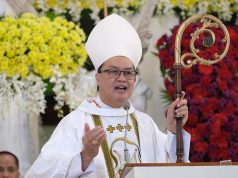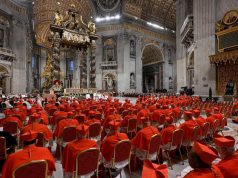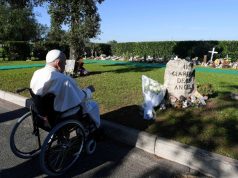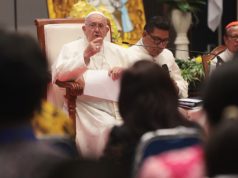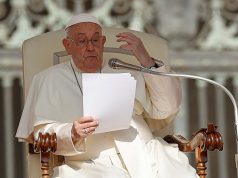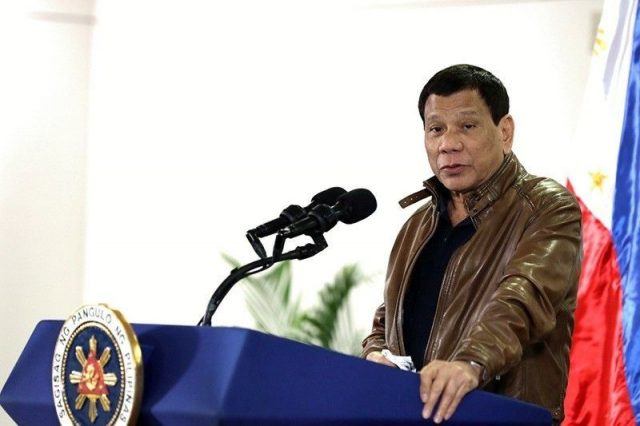
President Rodrigo Duterte joked about the Catholic faith anew, specifically the observance of All Saint’s Day, following his earlier statement of calling for a “solemn” celebration.
Rather than saints, Duterte said in a speech in Cauayan City, Isabela province that people should honor his own image at the altar and call it “Santo Rodrigo.”
READ: ‘Santo Rodrigo’: Duterte pokes fun at Catholic ‘All Saints Day’
This remark came while Filipinos in many parts of the country remember their departed loved ones.
This was also a few months after his repeated controversial slurs against Catholic bishops and Christian teachings, and then issuing a public apology to the divine.
Santo Rodrigo
Malacañang initially released a statement of Duterte’s message to Filipinos for both All Saints’ Day and All Souls’ Day.
In it, he said that he was “with the Christian faithful” in the observance of these occasions and encouraged Filipinos to emulate the saints and honor the people who had already gone “in the grace of God.”
He then questioned the purpose of dedicating another day for the saints during his visit to victims of Typhoon Rosita in Cauayan, Isabela.
He first greeted the crowd with “Happy All Saints’ Day,” and then proceeded to his slurs against the long-held Filipino tradition.
“Bakit ba may All Souls’ Day tapos may All Saints’ Day, ‘di nga natin alam ano ‘yung mga santo,” the chief executive said.
He then suggested that people to use a picture of him to revere as their patron saint.
“Dito na lang kayo, I’ll give you one patron, para hindi na kayo magpasyal. Get hold of a picture of mine, ‘yan ang ilagay niyo sa altar, Santo Rodrigo,” Duterte said, eliciting laughter from the audience.
Several Filipinos, however, took offense and noted the abrupt change of his messages.
Yan ang plastic.
—-
Hours after… https://t.co/tx8uj1MD9Y— Byron Villegas (@bikepackingPH) November 1, 2018
“Duterte urges Filipino to follow virtuous example example of saints” (few minutes later) “Duterte calls saints gago, drunkards” and he suggested to put “Santo Rodrigo” on the Altar.
Disgusting and Annoying coiled together, and he is the President of the Philippines. 🙄
— y o s h i b o y (@ArthurJoshua2) November 2, 2018
Twitter user Ken Callawood, meanwhile, rebuked such pronouncements as unbecoming for a leader.
Religion and religious beliefs are very personal to the faithful…
A head of state should not mock or criticize openly religious beliefs/practices.
Oh well, he just have the title; not the statesmanship that should go with it.https://t.co/btDFNngYSO
— Ken Callawood (@KenCallawood) November 1, 2018
Duterte was criticized in June for calling God in the Christian Bible stupid, questioning the Christian creation story and challenging the faithful to prove that God exists.
He soon recanted and said “Sorry, God” after meeting with representatives of the Christian Church.
However, it was clarified that the apology was only for the divine and not to the church and to the Christians whom he offended.
Origins of All Souls’ Day and All Saints’ Day
Despite both observances being similar, the day for the souls and the day for the saints have different origins.
Praying for or giving respects to the dead has been part of many cultures around the world and has existed for hundreds of years.
However, it was only in 1048 AD when a monk from the Benedictines of Cluny, a small community in Eastern France, decreed to make November 2 the Day for Departed Ones.
It took around three hundred years before Rome made it official throughout the Catholic Church.
The day for saints, meanwhile, is traced to the Feast of All Holy Martyrs which started in 844 AD.
The celebration was transferred to November 1 by Pope Sixtus IV as a holy day of obligation.
According to a columnist, the reasons for honoring these special dates were also different.
The All Saints’ Day is for paying homage to all the saints and martyrs who don’t have special festivals dedicated for them.
The All Souls’ Day, meanwhile, is for the living to pray for the souls in the purgatory, the stage prior to entering Heaven in the Roman Catholic dogma.




